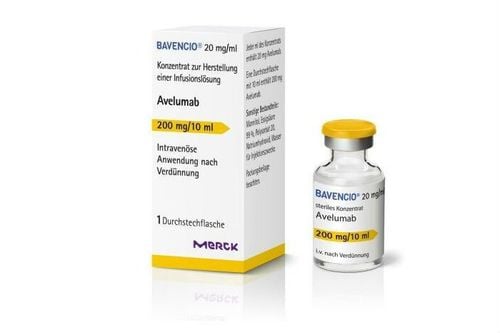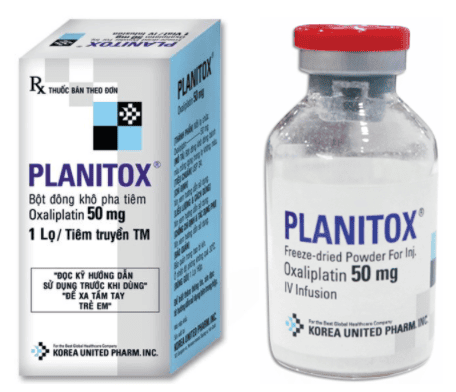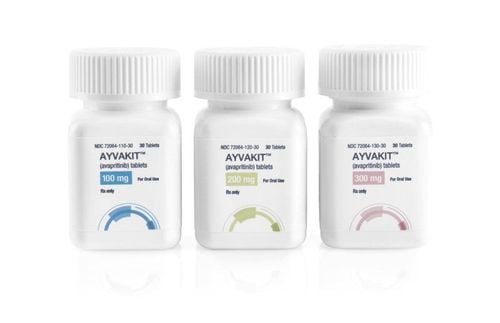This is an automatically translated article.
Oxlatin is an anti-cancer drug and affects the patient's immune system. Medicines should be used in accordance with the dosage and prescription of the doctor. Let's learn about the use of Oxlatin in the following article.1. What does Oxlatin do?
Oxlatin medicine contains the active ingredient Oxaliplatin 50mg in each bottle of 10ml solution along with excipients. The drug is packaged as a concentrated solution for intravenous infusion.
Oxlatin has anti-cancer effects and affects the body's immune system.
2. Indications for Oxlatin
Oxlatin is prescribed by a specialist doctor. Usually, Oxlatin is indicated for the treatment of a number of conditions as follows:
Treatment of gastrointestinal cancers such as advanced colon cancer. Support in the treatment of patients with stage III colorectal cancer who have undergone complete resection of the primary tumor.
3. Dosage and how to use Oxlatin
3.1 How to use: Oxlatin should be used under the supervision of a doctor, medical staff experienced in the use of cancer chemotherapy drugs. In the course of treatment, it is necessary to prepare adequate facilities to handle complications and appropriate treatment.
3.2 Dosage: Adults: Oxaliplatin 85 mg/m2 body, intravenous infusion 2 to 6 hours.
It is necessary to apply the exact dose of Oxlatin as directed by the doctor or pharmacist. Patients do not arbitrarily calculate, apply or change the dose of Oxaliplatin.
4. Oxlatin overdose
Oxaliplatin belongs to the group of prescription drugs, so patients need to be taken according to the prescribed dose. In case of an overdose of Oxlatin, stop using it immediately and tell your doctor or pharmacist if you have any unusual symptoms. Or immediately contact 115 or the nearest hospital for assistance in dealing with abnormal occurrences.
5. Contraindications to Oxlatin
Oxlatin drug is contraindicated in some specific cases as follows:
People who are sensitive to Oxlatin drug components and platinum derivatives or any of its ingredients. Pregnant women; Women who are breastfeeding; Patients with severe myelosuppression (symptoms of neutrophils < 2 x 10 to 9/L and/or platelets < 100 x 10 to 9/L) People with peripheral sensory neuropathy causing loss of function ; Patients with severe renal impairment (creatinine clearance < 30 mL/min); Children in the target group are not indicated to use Oxlatin drug.
6. Side effects when using Oxlatin
Infections, rhinitis, upper respiratory tract infections, blood infections due to leukopenia.
Anemia due to neutropenia, fever due to leukopenia; Rarely autoimmune thrombocytopenia;
Disorders of the immune system causing allergic reactions;
Nutritional disorders: Anorexia, hyperglycemia, hypokalemia, hypernatremia, dehydration, metabolic acidosis (rare);
Psychiatric disorders: Insomnia, depression, restlessness (rare);
Nervous system disorders: Peripheral neuropathy, loss of taste, headache, sensory disturbances, dizziness
7. Oxlatin drug interactions and incompatibilities
7.1 Drug Interactions Oxlatin Oxlatin in combination with Clazpin increases the risk of agranulocytosis in patients; Trastuzumab may increase the concentration and effects of Oxaliplatin; Echinacea may decrease the concentration and effects of Oxaliplatin; Oxaliplatin in combination with Aminoglycosides, Capreomycin, Polymyxin and diuretics can increase the risk of kidney toxicity and ototoxicity in patients; Oxaliplatin should not be combined with live vaccines and Natalizumab, because of the potential for increased concentrations and effects. Oxaliplatin may increase the prolongation of prothombin time and INR when combined with anticoagulants. 7.2 Oxlatin drug incompatibility Do not use sodium chloride solutions or solutions containing sodium chloride to dilute Oxaliplatin drugs;
Oxaliplatin 0.5mg/ml combined with Diazepam 5mg/ml will create a white precipitate immediately after mixing.
Oxaliplatin is incompatible with alkaline solutions or drugs (such as 5-Fluorouracil). Therefore, these solutions should not be mixed or injected simultaneously on the same infusion line.
8. Caution when using Oxlatin
In the course of taking Oxlatin, patients and medical staff should pay attention to the following:
Extravasation of Oxaliplatin drug should be stopped and treated locally; Use caution when dealing with drugs and drug wastes, because of the toxicity of anticancer drugs; People who do concentrated work such as driving, operating machinery should be careful when using Oxlatin, because the drug increases the risk of dizziness, nausea and other neurological symptoms affecting the balance of the body. user. Patients should have a neurological examination before and after treatment with Oxlatin. Patients should have a complete blood count before treatment with Oxlatin. Children under 15 years of age should consult a specialist before taking Oxlatin. Oxlatin contains the active ingredient Oxaliplatin is a drug used only in oncology and needs to be prescribed, you do not arbitrarily use it without your doctor's prescription. In case you have any questions or problems while taking Oxlatin, you should notify your doctor for timely advice and support.
Please dial HOTLINE for more information or register for an appointment HERE. Download MyVinmec app to make appointments faster and to manage your bookings easily.













